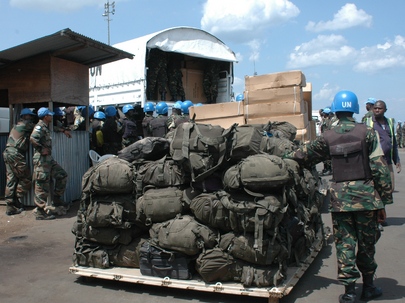 |
| Photo: UN Photo/ Clara Padovan |
On March 28, 2013, the UN Security Council passed a resolution extending the mandate of the UN peacekeeping mission in the DRC, abbreviated Monusco. However, apart from a simple extension, the resolution also contained a novelty: Peacekeepers will now be allowed to use offensive force in order to protect the local population. This article, written by GPF’s Tim Pfefferle, ties in the new mandate with recent developments in the eastern areas of the DRC, which have been subject to a resurgence of violent rebel activity.
AUGUST 13, 2013 | TIM PFEFFERLE/GPF
Violence in Eastern DRC – UN to the Rescue?
On July 14th, a reported 60,000 Congolese refugees were driven across the border to Bundibugyo district in Uganda from the nearby area around the town of Kamango in eastern DRC. They had to flee their homes after an attack by the Ugandan rebel group Allied Democratic Forces (ADF). Apart from demonstrating the obvious pressures this places on Ugandan capacities to handle such enormous flows of refugees, these developments serve as a reminder of the fragile situation to which the DRC has once again returned. Having held much criticized general and presidential elections in late 2011, the eastern parts of the DRC found themselves in crisis once again in 2012.
Due to frustrations over a broken agreement with the Congolese government, which was supposed to integrate them as a political party, former rebels founded the M23 group. They set out to retake control of the areas bordering Rwanda and Uganda, finally taking the provincial capital Goma by November of 2012. By February of 2013 the parties had finally reached a peace agreement brokered by the United Nations, while, in a stunning move, rebel boss Bosco Ntaganda turned himself in to the US embassy in Kigali in March. Even though Ntaganda is facing trial at the International Criminal Court in The Hague, conflict returned in May as fighting flared up again in Goma.
This persistent state of instability has prompted the UN to take an unprecedented step. For the very first time, the United Nations is currently deploying an offensive combat force. The UN peacekeeping force, Monusco, had been criticized for its inability to act, standing by as the M23 rebels took Goma by force. This led to a situation where Monusco had lost its last vestiges of credibility among the local population, which undermined the legitimacy of the UN’s presence in the DRC. Under the new UN mandate, peacekeepers can now use force in situations other than self-defense in order to protect the local population. Given the UN’s traditional role as a mediating force, this is a potentially path breaking move.
The conflict between M23 and the Congolese government demonstrates both the regional dimension and the deep entrenchment of strife in eastern DRC. For one, there is a widespread consensus that Rwanda has been backing the M23 movement, a charge which it has denied consistently. However, the fact that Ntaganda, himself a Rwandan national, turned himself in indicates that the movement has lost some of its support from its Rwandan backers. Uganda has also been alleged to have been supporting M23 operations. Secondly, conflict in eastern DRC builds on a long series of economic and political failures. In a recent paper, Koen Vlassenroot and Karen Büscher of the Conflict Research Group have described how essential services such as the provision of health care have been entirely outsourced to a handful of NGOs. The long era under dictator Mobutu and the subsequent breakdown after the DRC became the corollary of the genocide in Rwanda have led to the corrosion of the state. The eastern parts of the country are especially vulnerable to these developments due to the proximity to the Rwandan and Ugandan neighbors and their considerable resource endowments.
The fact that enough of a vacuum has been created to harbor the once defunct ADF demonstrates the level of concern raised by the erosion of the state’s capacity. Whether the UN’s new mandate will be able to address some of these issues remains to be seen. In any case, it will likely only offer a short-term solution in dealing with M23. In its first move, Monusco gave rebels an ultimatum to leave Goma. Apart from considerable debate over the merits of offensive combat force, M23 is unlikely to be the last specter haunting eastern DRC in the absence of more thorough measures.
